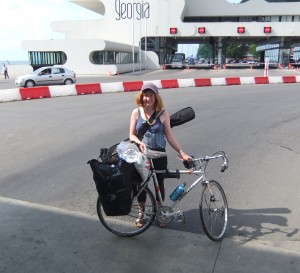Going against the tide: overland to Georgia
Travelling east through Europe by land goes against one conceptual and one actual tide. First of all, the tide of expectations, which dictates that a western European with certain means at her disposal should really take a flight when she’s going to somewhere which is several thousand kilometres away. And secondly, the tide (as the EU would have us believe; it could more accurately be termed a trickle) of migrants coming from Asia and countries on the eastern edges of Europe, making their way west in hope of a better life. Usually it’s not through choice or by lack of means that these travellers take the land route. Often, their risky journeys involve high fees to smugglers who attempt to get them across borders, onto boats, buses and lorries. Their choice of the land route is necessitated by the harsh reality of rejected visas for the EU and the impossibility of passing through airport controls without these necessary documents. In order to have any chance of reaching the country where they aspire to make a life, migrants must make epic journeys across countries, risking imprisonment, deportation and death at every turn.
I have just made the reverse journey that someone from the Caucasus might make, that many Chechens, Georgians and Armenians and others have made in recent years, in order to reach Europe. From Paris to Tbilisi, it was a nine-day odyssey on trains, buses and a ferry with my bicycle carrying my luggage and my guitar. I hardly felt the borders as I crossed them, which is the western European person’s privilege. After speeding through Germany, Austria and Hungary, I was jolted awake on the night train to Bucharest by Romanian border police as we reached the end of the Schengen zone. Of course, a flash of my EU passport was enough to send them on their way, but it was a reminder of the reality of European ‘freedom of movement’, limited to select countries and for a select few.
Bulgarian police also boarded the train for passport checks, and finally in Turkey I not only had to produce my passport, but also a visa (easily procured at the border for 15 euros). Each time, the circled stars of Europe worked their magic and opened the doors, letting me sail through. After crossing Turkey by train, I cycled the last few kilometres to the Georgian border where I was politely bid farewell by Turkey and warmly greeted by Georgia, which has a visa-free regime for EU citizens. To my surprise, the border official asked me only if this was my first time in Georgia, and in a more friendly than professional tone, skipping the usual “what is your purpose in the country?”, “for how long will you be staying?” which I have come to expect with international travel. And just behind the smiling border guards, an IOM ‘Screening centre for vulnerable migrants’, ostensibly to protect those being trafficked, but more than likely another cog in the machine stopping the flow of people westwards.
After a slow train ride from the Black Sea coast across Georgia, I reached Tbilisi, my final destination. It had been an exciting nine days of adventure which had nonetheless left me exhausted. I find it difficult to imagine how such distances could be covered overland with the extra complications of avoiding border checkpoints and official means of transportation such as trains. For people fleeing hardship and persecution, the roads are blocked, and they must struggle to make their way to safety. What is worse, when they reach their ‘safe harbour’, they invariably risk imprisonment or deportation. After the money and time I had invested in my journey to Tbilisi, I can easily imagine the sense of injustice and outrage I would feel should the Georgian government decide to put me on the next flight back to France. Yet, due to an accident of birth, I do not risk imprisonment or ‘readmission’ to my country of origin and can enjoy a privilege denied to so many – that of settling into a new country without fear.
find it difficult to imagine how such distances could be covered overland with the extra complications of avoiding border checkpoints and official means of transportation such as trains. For people fleeing hardship and persecution, the roads are blocked, and they must struggle to make their way to safety. What is worse, when they reach their ‘safe harbour’, they invariably risk imprisonment or deportation. After the money and time I had invested in my journey to Tbilisi, I can easily imagine the sense of injustice and outrage I would feel should the Georgian government decide to put me on the next flight back to France. Yet, due to an accident of birth, I do not risk imprisonment or ‘readmission’ to my country of origin and can enjoy a privilege denied to so many – that of settling into a new country without fear.















